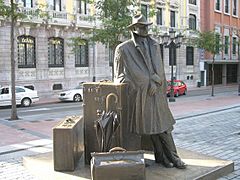Travel facts for kids

Travel is the activity of going from one place to another place. When a person makes the same trip every day to work or school, this type of travelling is usually called "commuting." Some people travel to other cities as part of their job. This is called "business travel." When many people travel to a distant place to stay, it is called "human migration".
Some people travel on their vacation, to visit other towns, cities, or countries. This is tourism. These people stay overnight in hotels, hostels, motels, apartments or bed and breakfast. Some prefer camping. Through the centuries, modes of travel have changed. Some people (travel writers) write about travelling in books including autobiographies or journals.
Types of travelling:
- Hiking
- Cruise ship vacations
- Pilgrimage
- Train journeys
- Hitch-hiking
- Driving
- Flight
Contents
Purpose and motivation
Reasons for traveling include recreation, holidays, rejuvenation, tourism or vacationing, research travel, the gathering of information, visiting people, volunteer travel for charity, migration to begin life somewhere else, religious pilgrimages and mission trips, business travel, trade, commuting, obtaining health care, waging or fleeing war, for the enjoyment of traveling, or other reasons. Travelers may use human-powered transport such as walking or bicycling; or vehicles, such as public transport, automobiles, trains, ferries, boats, cruise ships and airplanes.
Motives for travel include:
- Pleasure
- Relaxation
- Discovery and exploration
- Adventure
- Intercultural communications
- Taking personal time for building interpersonal relationships.
- Avoiding stress
- Forming memories
- Cultural experiences
- Volunteering
- Festivals and events
Geographic types
Travel may be local, regional, national (domestic) or international. In some countries, non-local internal travel may require an internal passport, while international travel typically requires a passport and visa. Tours are a common type of travel. Examples of travel tours are expedition cruises, small group tours, and river cruises.
Famous travellers
- Michael Palin
- Marco Polo
- Ibn Batuta
Interesting facts about travel
- Air travel has become so ubiquitous in the 21st century that one woman, Alexis Alford, visited all 196 countries before the age of 21.
- Many countries do not recognize drivers' licenses from other countries; however most countries accept international driving permits.
- The origin of the word "travel" is most likely lost to history. The term "travel" may originate from the Old French word travail, which means 'work'.
- According to the Merriam-Webster dictionary, the first known use of the word travel was in the 14th century.
- In the late 16th century, it became fashionable for young European aristocrats and wealthy upper-class men to travel to significant European cities as part of their education in the arts and literature. This was known as the Grand Tour, and included cities such as London, Paris, Venice, Florence, and Rome.
Related pages
Images for kids
-
Travelers in a British Airways 747 airplane. Air travel is a common means of transport.
See also
 In Spanish: Viaje para niños
In Spanish: Viaje para niños



